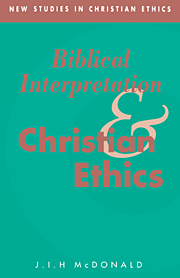Book contents
- Front Matter
- Contents
- General editor's preface
- Preface
- Abbreviations
- Introduction: Relating the Bible to Christian ethics
- Part One LIBERAL PRINCIPLES AND PRACTICE
- Part Two ESCHATOLOGY AND ETHICS
- Part Three PARTICIPATION IN MEANING
- Chapter 7 Ethics and historical interpretation
- Chapter 8 Ethics and contemporary reading
- Notes
- Select bibliography
- Index
Chapter 7 - Ethics and historical interpretation
Published online by Cambridge University Press: 22 September 2009
- Front Matter
- Contents
- General editor's preface
- Preface
- Abbreviations
- Introduction: Relating the Bible to Christian ethics
- Part One LIBERAL PRINCIPLES AND PRACTICE
- Part Two ESCHATOLOGY AND ETHICS
- Part Three PARTICIPATION IN MEANING
- Chapter 7 Ethics and historical interpretation
- Chapter 8 Ethics and contemporary reading
- Notes
- Select bibliography
- Index
Summary
An ethic of historical reading changes the task of interpretation from finding out 'what the text meant' to the question of what kind of reading can do justice to the text in its historical contexts.
(E. Schüssler-Fiorenza)In modern biblical scholarship, the historical critical method has acquired the status of foundational discipline. It has provided focus, method and apparent objectivity. It has served as Occam's razor to cut away all pre-emptive moves to undermine the critical probing of tradition at the instance of dicta, or to prescribe the meaning of the text before a critical examination of it has been executed. Its weakness has resided in its imperialism, in its tendency to claim too much either in determining ‘what the text meant’ or in discovering ‘what actually happened’, and in becoming an end in itself. Like fire, it supplies essential energy, but it needs to be controlled.
There are good reasons to be concerned with historical context and the critical readings which do justice to the text in this respect. All biblical material is contextual material, and must be treated as such. If it is correct to say ‘so-called biblical ethics is situation ethics that often sets itself up as immutable divine decree’, then the danger of distortion through dogmatism is great indeed. A contextual reading – that is, reading primarily in ethical–political terms – can therefore serve as a corrective to later dogmatic impositions and to modern accommodations.
- Type
- Chapter
- Information
- Biblical Interpretation and Christian Ethics , pp. 169 - 199Publisher: Cambridge University PressPrint publication year: 1993



